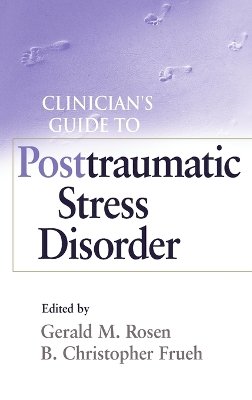
Stock image for illustration purposes only - book cover, edition or condition may vary.
Clinician´s Guide to Posttraumatic Stress Disorder
Gerald M Rosen
FREE Delivery in Ireland
Description for Clinician´s Guide to Posttraumatic Stress Disorder
Hardcover. The diagnosis of Posttraumatic Stress Disorder (PTSD) has increasingly been the focus of clinicians' attention when treating patients after stressful life events. This book addresses the needs and interests of practicing clinicians who need access to the findings and concerns researchers and policy makers have about PTSD. Editor(s): Rosen, Gerald M.; Frueh, Christopher. Num Pages: 320 pages, Illustrations. BIC Classification: JM; MMH. Category: (P) Professional & Vocational. Dimension: 236 x 161 x 27. Weight in Grams: 580.
Praise for Clinician's Guide to Posttraumatic Stress Disorder "Rosen and Frueh's important book takes a huge leap toward clarity. The chapters are authored by leading experts in the field, and each addresses one of the pressing issues of the day. The tone is sensible and authoritative throughout, but always with a thoughtful ear toward clinical concerns and implications."
—George A. Bonanno, PhD Professor of Clinical Psychology Teachers College, Columbia University
"All clinicians and researchers dealing with anxiety disorders should have a copy of Rosen and Frueh's Clinician's Guide to Posttraumatic Stress Disorder on their shelves. Moreover, they should ... Read moreread it from cover to cover. This compilation . . . is authoritative, very readable, and extremely well crafted. The issues are looked at from many vantage points, including assessment and treatment, cross-cultural, cognitive, and categorical/political."
—Michel Hersen, PhD, ABPP Editor, Journal of Anxiety Disorders Dean, School of Professional Psychology, Pacific University
Clinician's Guide to Posttraumatic Stress Disorder brings together an international group of expert clinicians and researchers who address core issues facing mental health professionals, including:
-
Assessing and treating trauma exposure and posttraumatic morbidity
-
Controversies and clinical implications of differences of opinion among researchers on the definition and diagnosis of the condition
-
Treating the full range of posttraumatic reactions
-
Cross-cultural perspectives on posttraumatic stress
Show Less
Product Details
Publisher
John Wiley & Sons Inc United Kingdom
Place of Publication
New York, United States
Shipping Time
Usually ships in 7 to 11 working days
About Gerald M Rosen
GERALD M. ROSEN, PhD, ABPP, is a clinical professor with the Department of Psychology at the University of Washington and the Department of Psychiatry and Behavioral Sciences at the university's School of Medicine. He maintains a private practice as a clinical psychologist. He has published numerous articles on PTSD, served as editor of Posttraumatic Stress Disorder: Issues and Controversies (Wiley), ... Read moreand as co–guest editor with Dr. Frueh for a special issue on PTSD in the Journal of Anxiety Disorders. B.CHRISTOPHER FRUEH, PhD, is Director of Clinical Research at The Menninger Clinic and Professor of Psychology at the University of Hawaii. Formerly a clinician and director of a VA PTSD clinic in Charleston, South Carolina, his research interests are in clinical and mental health service delivery to trauma, both for veterans and civilians. He has seventeen years of experience in the field of traumatic stress and has served as primary investigator on twelve federally funded research grants relevant to this area. Show Less
Reviews for Clinician´s Guide to Posttraumatic Stress Disorder
"Contributors to this impressive collection include Robert Spitzer, one of the architects of DSM-III, and Jerome C. Wakefield and Allan V. Horwitz, authors of The Loss of Sadness: How Psychiatry Transformed Normal Sorrow into Depressive Disorder (Oxford University Press, 2007).... It is ironic that research spurred by the introduction of posttraumatic stress disorder (PTSD) has come to challenge almost every ... Read moreaspect of the construct's originating assumptions. These issues are carefully discussed: the idea of a specific aetiology; the distinctiveness of the supposed core symptoms; the loosening of the stressor criterion, which editor Gerald Rosen calls 'criterion creep'.... Without a coherent position on the question of specific aetiology, the validity of PTSD rests largely on the distinctiveness of its clinical syndrome, yet its features overlap substantially with other psychiatric categories.... This book interrogates the construction of PTSD and can serve as a case example of the way to critique the construction of psychiatric knowledge across the whole field." (Derek Summerfield, The British Journal of Psychiatry, 2011, 199:347) Show Less

